The Rare, Sophisticated & Powerful Bugatti Mistral is a Tribute to The W16 Engine
- 11th Nov 2022
- 1765
- 0

Since the introduction of the Veyron in 2005, the w16 engine has been the throbbing heart of each and every Bugatti. The road-going vehicle that concludes the W16 period was always supposed to be exceptional: exclusive, stylish, and powerful. It must be the finest in its category. The W16 Mistral is the pinnacle of roadster design.
Mate Rimac, CEO of Bugatti Rimac, said,
"We knew we had to develop a roadster for the last appearance of Bugatti's renowned W16 engine on the road. Over forty percent of all Bugatti cars ever produced were convertibles, generating a lengthy lineage of performance legends that are still adored today. Prior to the launch of the W16 Mistral2, there had been no roadster in the Chiron1 period; thus, the W16 Mistral2 is a continuation of this tradition, driven by customer demand for a brand-new way to enjoy the tremendous performance of our renowned engine. The W16 Mistral inaugurates the new chapter in the Bugatti roadster saga, which was inspired by more than a century of open-top legends."
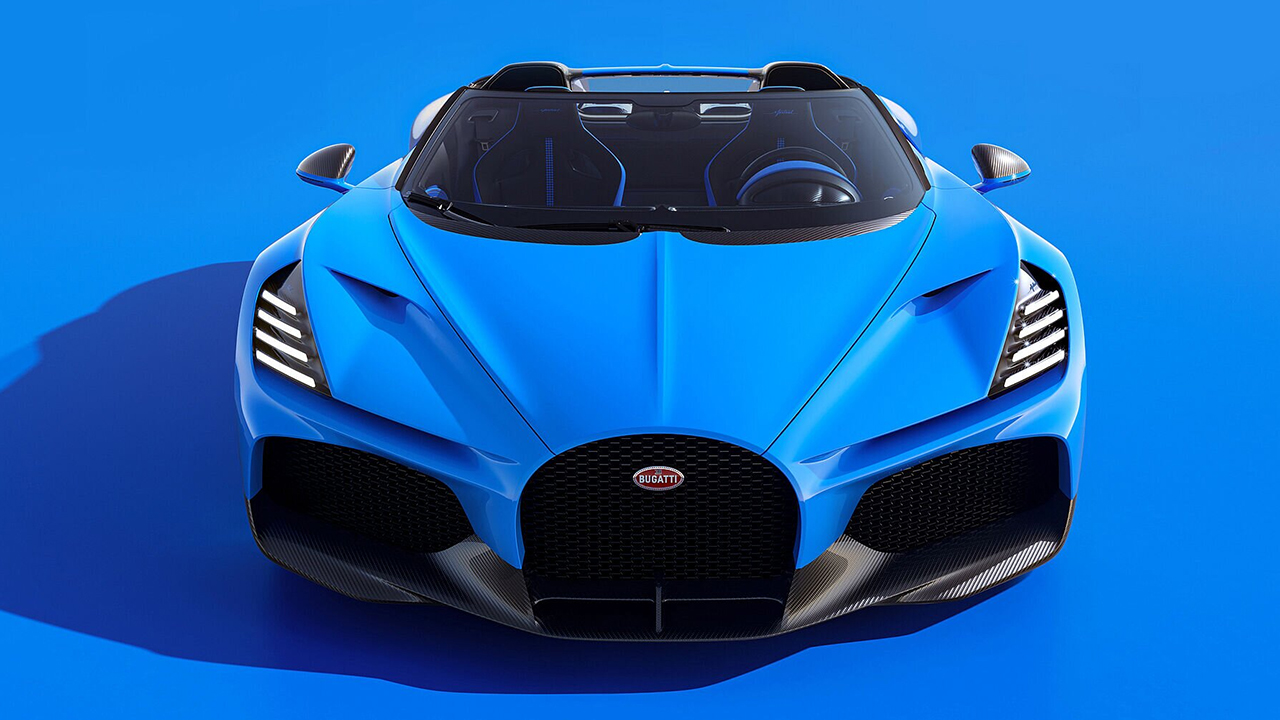
For a vehicle as memorable and significant as this one, tremendous care was taken in selecting its emblem. The roadster required a name that evoked freedom, grace, and speed. It was much more than a mere evolution of the Chiron. The mistral, a strong wind that sweeps from the Rhône River valley through the fashionable cities of the Côte d'Azur in southern France and onto the Mediterranean, was the source of inspiration. And since the engine is so fundamental to the character of this roadster, it stands beside this strong wind: W16 Mistral.
Built on the definitive 1,600 PS version of the W16 engine, which debuted in the Chiron Super Sport 300+3, the W16 Mistral provides performance unmatched by any previous open-top vehicle. The current monocoque is not simply removed above the A-pillars to make room for the new open-top design; rather, it has been reengineered and sculpted to provide a more rounded look without sacrificing performance.
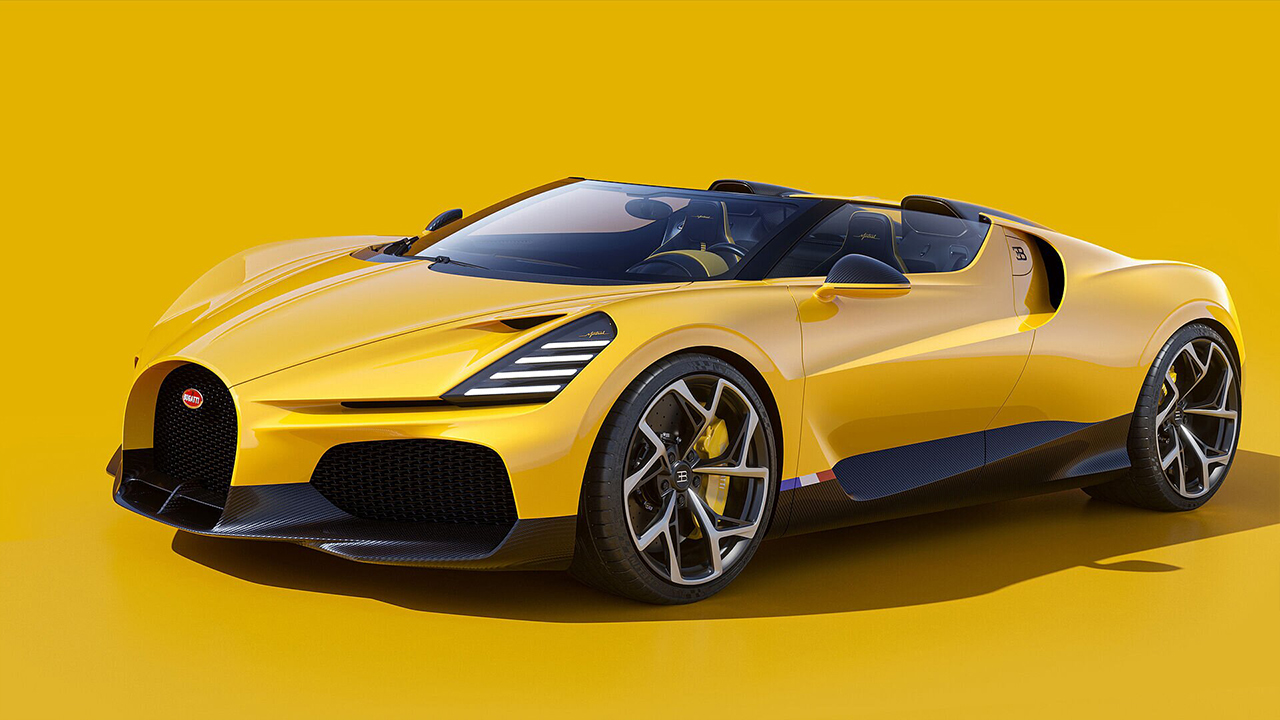
Bugatti's Director of Design, Achim Anscheidt, said, "We are aware that the W16 Mistral will always have a special place in the company's history, since it represents the last time that perhaps the most powerful automotive powerplant was employed in a road-going production vehicle. As a design team, we felt immense pressure to provide aesthetics that quickly expressed this momentous occasion, borrowing influence from Bugatti's most exquisite roadsters.
The 1934 Bugatti Type 57 Roadster Grand Raid, a sporty roadster that symbolises the peak of exquisite design, would serve as their inspiration. This Grand Raid, which is on exhibit at the Louwman Museum in Den Haag, is effortlessly classy with a subtle sportiness. It is distinguished by its twin aerodynamic headrests, which flow rearward into the bodywork, and its V-shaped windshield. Finished in a two-tone black and yellow paint scheme, it would serve as the ideal inspiration for this pivotal time in Bugatti's history.
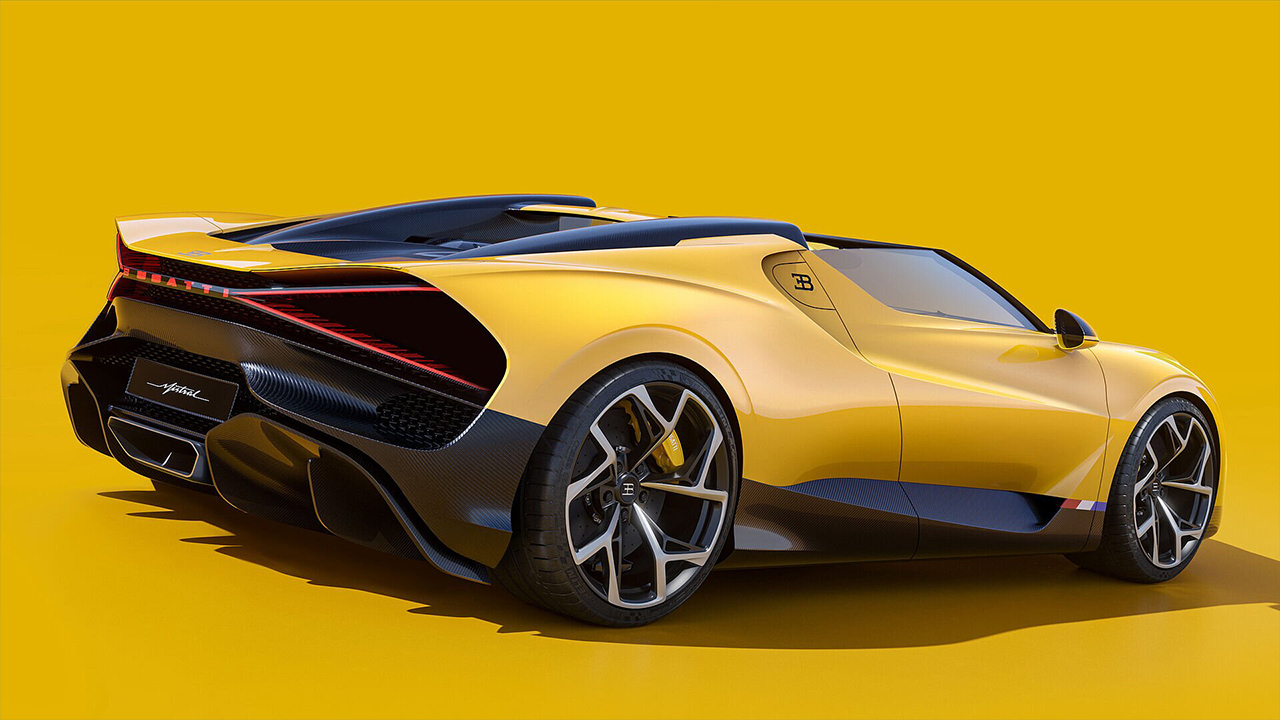
The W16 Mistral appears in hues inspired by the Bugatti Type 57 Roadster Grand Raid: a warm black with traces of truffle brown and light yellow accents. Not only is it a tribute to the renowned coachbuilt body, but also to Ettore Bugatti, who picked black and yellow for several of his personal vehicles, notably the Type 41 Royale. For brand fans, this is a timeless visual match.
The W16 Mistral takes the V-shaped windshield of the Grand Raid and transforms it into a contemporary piece of art. A curved windshield that seems to wrap over the A-pillars, combining smoothly with the side windows to create a visor-like look that alludes to the motorsport-grade performance levels offered by the W16 Mistral. The windshield is a technical wonder, bent precisely to achieve the rounded visor shape without impairing the driver's field of view.
The upper edge of the windshield and side windows flows around the side air intakes with intent. This character line then flows back under the side glass and shoots through to the front horseshoe grill, producing a new three-dimensional character for the renowned Bugatti C-line debuted on Chiron. The oil cooler intakes on the side were separated from the engine air intakes, which now reside on the roof immediately above the passengers, in order to keep the body side section thin while allowing for optimal airflow to the W16. The two new roof-mounted engine air vents are a tribute to the Type 57 Roadster Grand Raid and the Veyron 16.4 Grand Sport, the first open-top Bugatti of the current era. The W16 Mistral has a completely own personality; it is tauter, more forceful, and seems to spring ahead.
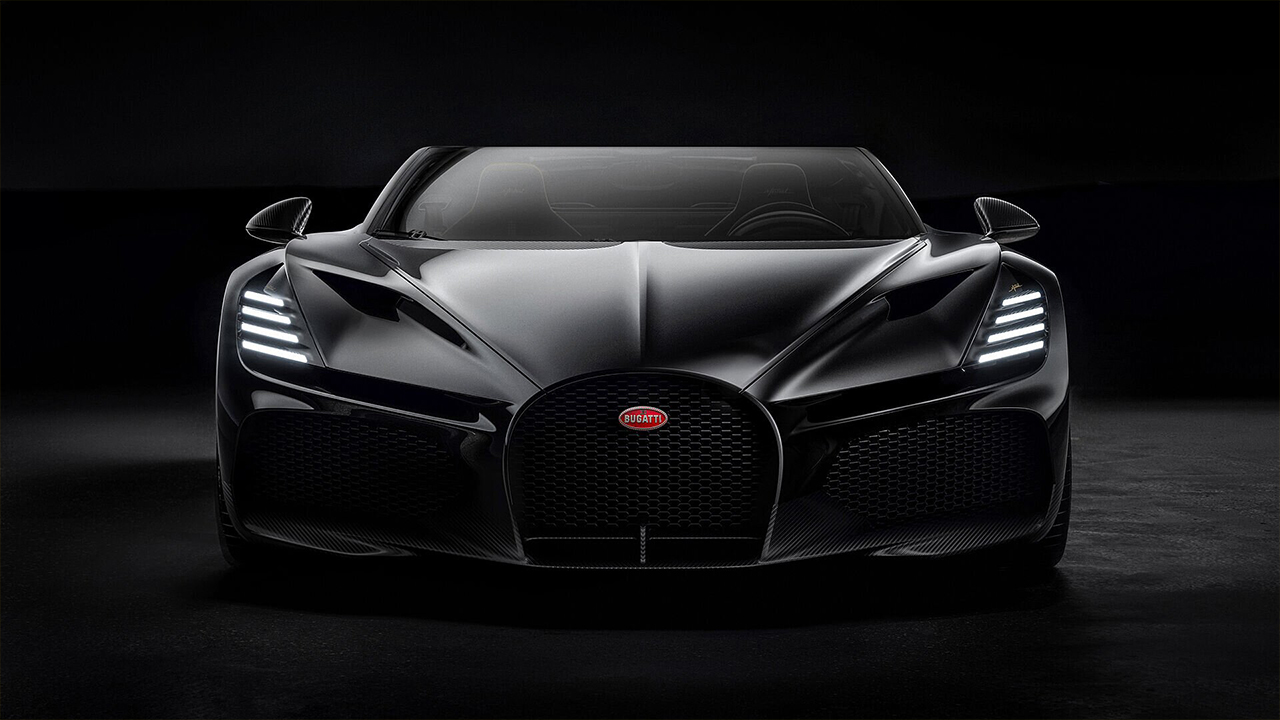
Anscheidt explains, "To express the W16 Mistral's new personality, we completely redesigned its frontal aspect in keeping with the vertical arrangement of our one-of-a-kind or limited-edition models like as Divo4 and La Voiture Noire5. It is instantly infused with a feeling of luxury; the vertically stacked headlights are wholly custom and the iconic horseshoe grille has been reinvented to be considerably deeper and broader. Bolide's6 X-theme taillight pattern, which has made an indelible impression on the world of vehicle design, presented us with the task of creating a dramatic but yet more graceful incarnation.
To develop a vehicle like the W16 Mistral demands diligent application of Bugatti's "Form Follows Function" design philosophy, with each component conceived not just to establish new aesthetic standards, but also to contribute to attaining whole new levels of performance.
Frank Heyl, Bugatti's Deputy Design Director, said, "The headlights themselves are ingeniously formed, with a four-light signature that discreetly references the W16 Mistral's four-wheel drive and four turbochargers. However, its three-dimensional surface also serves as an aerodynamic help by channelling air through the light and out the tyre arch, so reducing aerodynamic drag. The larger horseshoe grille enables the high-temperature engine radiator to be completely fed by a single intake, while the two side intakes are limited to sending air to the intercoolers.
"In the meanwhile, the X-taillight helps to vent the side oil coolers through ducts linking the triangular negative space between the X beams to the side radiators. Therefore, a pressure drop is formed between the side intakes and the outlets at the rear of the W16 Mistral, which aids in the efficient management of the W16's mid-temperature cooling circuit."
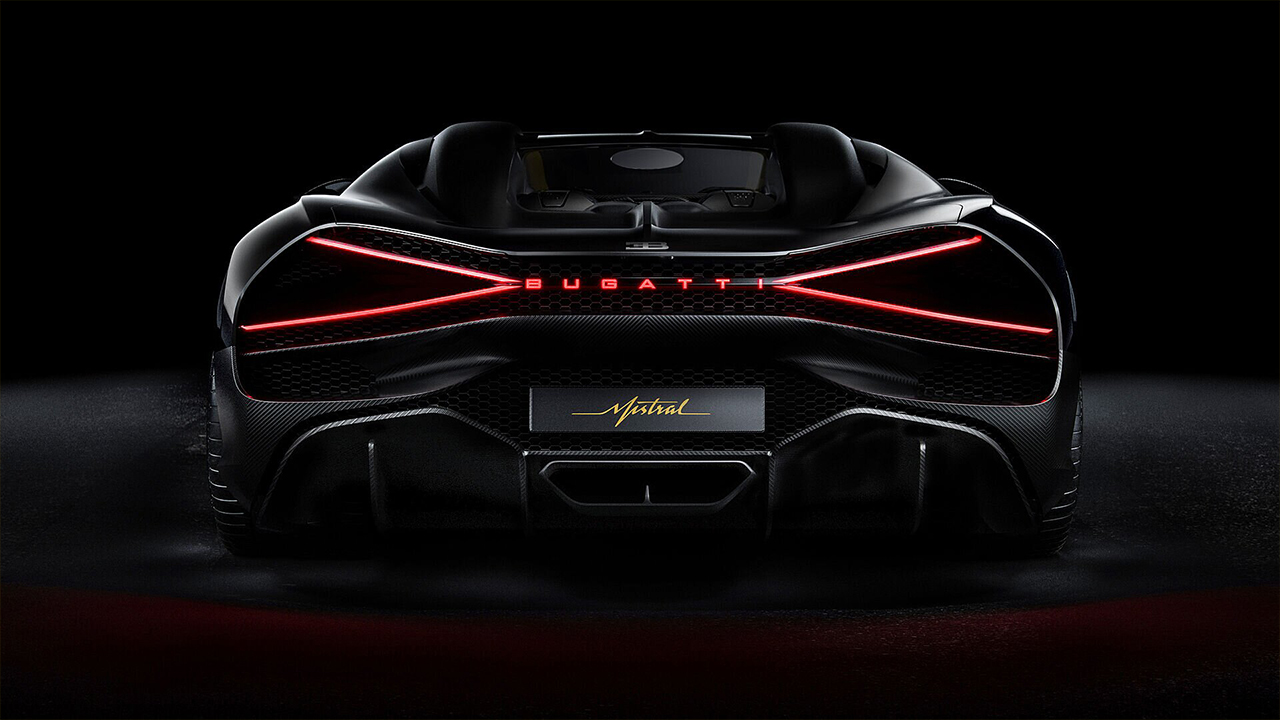
However, the useful design features do not stop there. Each of the new ram induction air scoops behind the headrests is constructed from a carbon fibre framework that can hold the whole vehicle's weight in the event of a rollover. This revised intake architecture further enhances the driver's W16 experience by accentuating the difference between the deep, thunderous, rumbling 8-liter displacement intake noise at throttle on and the blow off valve whistle from the four turbochargers at throttle lift. It offers an unrivalled auditory experience in the automobile industry.
The W16 Mistral is equipped with cutting-edge technological advancements to achieve unparalleled levels of beauty and exhilaration. Bugatti's innovative composite materials are combined with cutting-edge titanium and aluminium 3D printing to provide spectacular design, maximum performance, and rugged dependability. A comprehensive investigation of the W16 Mistral's dynamic stiffness enabled engineers to create lightweight solutions that assure optimal handling and performance in the most harsh situations.
The W16 Mistral's interior is inspired by that of the Chiron, and has been fine-tuned to give an experience that is both attractive and opulent, while still being practical enough to guarantee that all information is viewable at speeds up to 420 kilometres per hour. The commitment to material quality remains a defining characteristic of Bugatti design; sophisticated, lightweight titanium, aluminium components machined from a solid block, and supple, defect-free leathers. However, this farewell song for the W16 also has all new design touches.
On the newly designed door panels is an intricately braided leather that has been painstakingly tested and manufactured to Bugatti's exacting quality standards with an eye toward regular usage a century from now. In an homage to the W16 Mistral's legendary ancestors, the gear shifter is machined from a solid block of aluminium and incorporates a touch of wood and an amber inset containing Rembrandt Bugatti's renowned "dancing elephant" sculpture. This sculpture was featured on the bonnet of the famed Type 41 Royale, the world's most sumptuous roadster.
Under the Royale's enormous side-opening hood sat a 12.7-liter straight-eight engine, the likes of which had never been seen in the world. And the W16 Mistral's engine is as ambitious, being the only W16 powertrain now in use in automobiles.
In 2013, the Bugatti Veyron 16.4 Grand Sport Vitesse established a world speed record of 254.04 mph (408.84 km/h) with its 8.0-liter quad-turbo W16 engine producing 1,200 horsepower. The W16 Mistral is powered by the same engine that pushed the 2019 world-record-setting Chiron Super Sport 300+ to a speed of 304.773 mph. There can be just one objective: to regain the title of world's fastest roadster.
Mate Rimac, CEO of Bugatti Rimac, said, "The combination of a roadster body style and our W16 powerplant is flawless. With the roof removed and a pair of massive air intakes immediately behind your head pushing about 70,000 litres of air into the engine each minute at full throttle, driving the W16 Mistral brings you closer to the inner workings of this innovative powertrain than any Bugatti before it.
"What we also continue with the W16 Mistral is a history of Bugatti roadsters, each of them unparalleled in design, performance, and rarity, that dates all the way back to the company's inception. The Type 40, Type 41 Royale, Type 55 Roadster, and Type 57 Roadster Grand Raid that inspired this vehicle, or even the stunning beauty of the Type 57SC Corsica Roadster – Bugatti has always been synonymous with open-air driving. Even while the W16 Mistral marks the end of the roadgoing W16's heritage, we continue the roadster's tradition, which Ettore Bugatti founded more than a century ago."
The W16 Mistral will be limited to 99 units, with a net price of 5 million euros, and deliveries will begin in 2024.
The whole run of W16 Mistral has already been purchased.
 Suhas
Suhas


Comments
No comments yet.
Add Your Comment
Thank you, for commenting !!
Your comment is under moderation...
Keep reading luxury post